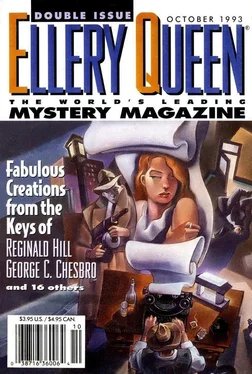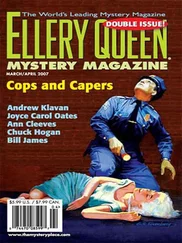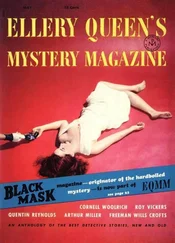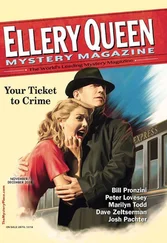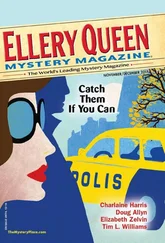Charles Ardai - Ellery Queen’s Mystery Magazine. Vol. 102, No. 4 & 5. Whole No. 618 & 619, October 1993
Здесь есть возможность читать онлайн «Charles Ardai - Ellery Queen’s Mystery Magazine. Vol. 102, No. 4 & 5. Whole No. 618 & 619, October 1993» весь текст электронной книги совершенно бесплатно (целиком полную версию без сокращений). В некоторых случаях можно слушать аудио, скачать через торрент в формате fb2 и присутствует краткое содержание. Город: New York, Год выпуска: 1993, Издательство: Davis Publications, Жанр: Детектив, на английском языке. Описание произведения, (предисловие) а так же отзывы посетителей доступны на портале библиотеки ЛибКат.
- Название:Ellery Queen’s Mystery Magazine. Vol. 102, No. 4 & 5. Whole No. 618 & 619, October 1993
- Автор:
- Издательство:Davis Publications
- Жанр:
- Год:1993
- Город:New York
- ISBN:нет данных
- Рейтинг книги:3 / 5. Голосов: 1
-
Избранное:Добавить в избранное
- Отзывы:
-
Ваша оценка:
- 60
- 1
- 2
- 3
- 4
- 5
Ellery Queen’s Mystery Magazine. Vol. 102, No. 4 & 5. Whole No. 618 & 619, October 1993: краткое содержание, описание и аннотация
Предлагаем к чтению аннотацию, описание, краткое содержание или предисловие (зависит от того, что написал сам автор книги «Ellery Queen’s Mystery Magazine. Vol. 102, No. 4 & 5. Whole No. 618 & 619, October 1993»). Если вы не нашли необходимую информацию о книге — напишите в комментариях, мы постараемся отыскать её.
Ellery Queen’s Mystery Magazine. Vol. 102, No. 4 & 5. Whole No. 618 & 619, October 1993 — читать онлайн бесплатно полную книгу (весь текст) целиком
Ниже представлен текст книги, разбитый по страницам. Система сохранения места последней прочитанной страницы, позволяет с удобством читать онлайн бесплатно книгу «Ellery Queen’s Mystery Magazine. Vol. 102, No. 4 & 5. Whole No. 618 & 619, October 1993», без необходимости каждый раз заново искать на чём Вы остановились. Поставьте закладку, и сможете в любой момент перейти на страницу, на которой закончили чтение.
Интервал:
Закладка:
He had his red and black plaid japanned collapsible tin lunch box all nicely secured with a web strap, and he made his buzzing noise of pleasure at the idea of doing something so new as going to school. Because he showed no apprehension over what would seem like an ordeal to another boy, she let forth one of her breaths of disgust. She had dressed him in a starched collar like mine which extended over the smart lapels of his beautiful blue suit, with its Norfolk jacket. His socks were well pulled up and his shoes were shined. She looked at me again, trying to say what she could not. Her white face with its flecks of fixed displeasure slowly took on a pleading smile. She squeezed my shoulders a little, hoping I would understand, even at my age, how John would need someone to look out for him, protect him, suffer him, since he was a child of such condition as she could not bring herself to admit. Her plea was resolved into a miniature of the principle of bribery by which her life was governed — even, I now think, to the terms on which Howard Burley obtained even her smallest favors.
“Richard,” she said, “when you and John come home after school” — and she pressed those words to show that I must bring him home — “I will have a nice surprise waiting for you both.”
John became agitated at this, jumping about, and demanding,
“What is it, Muzza, what is it?”
She gave one of her breaths.
“John, John, be quiet. Garsh. I can’t even say anything without getting you all excited.”
For my benefit she smiled, but the gold flecks under her eyes showed as angry dark spots, and the restrained power of her dislike of John was so great that he was cowed. He put his hands to his groin to comfort himself and said, using his word for what he always found there, “Peanut.”
At this his mother became openly furious at him.
“John! Stop that! How many times have I told you that isn’t nice. Richard doesn’t do it. Dr. Grauer has told you what will happen if you keep doing it. Stop it!”
She bent over to slap at his hands and he lunged back. Losing his balance, he fell, and I heard his head go crack on the hardwood floor of the hall where the morning light made pools of jewel colors through the glass panels. He began to cry in a long, burry, high wail. His mother picked him up and he hung like a rag doll in her outraged grasp. The day was already in ruins, and he had not even gone off to school. The scene was one of hundreds like it which made up the life of that mother and that son. I was swept by shame at seeing it.
“Now stop that ridiculous caterwauling,” she said. “Richard is waiting to take you to school. Do you want him to think you are a crybaby?”
John occasionally made startling remarks, which brought a leap of hope that his understanding might not be so deficient as everyone believed.
“I am a crybaby,” he said, burying his misery-mottled face in the crook of his arm.
A sudden lift of pity in his mother made her kneel down and gently enfold him in her arms. With her eyes shut, she gave her love to the imaginary son, handsome and healthy, whom she longed for even as she held the real John. It was enough to console him. He flung his arms around her and hugged her like a bear cub, all fur and clumsiness and creature longing.
“Muzza, Muzza,” he said against her cheek.
She set him off.
“Now can you go to school?” she asked in a playfully reasonable voice.
John’s states of feeling were swift in their changes. He began to smack his lips, softly indicating that he was in a state of pleasure.
“Then go along, both of you,” said his mother.
She saw us out the door and down the walk. Curiously enough, the self-sorrowing lump in my throat went away as I watched the scene between John and his mother. Things seemed so much worse with the Burleys than with me and my start in school.
I led John off at a smart pace, running sometimes, and sometimes walking importantly with short busy steps. We paused only once, and that was to look in the window at a little candy and news shop a block from the school, where with warm, damp pennies it was possible to buy sticky rolls of chocolate candy, or — even better — stamp-sized films which when exposed to light darkened in shades of red to reveal such subjects as the battleship New York or the Woolworth Building or the Washington Monument.
John always had more money than I.
“Let’s get some,” he proposed.
“No. After school,” I replied. “We will be late if we stop and we will catch the dickens.”
“Catch the dickens,” he said, and began to run away ahead of me. I overtook him and we entered the main door of the school — it was a red brick building with a portico of white pillars veiled in vines — and once in the dark corridors with their wood-ribbed walls, we seemed to lose ourselves to become small pieces of drifting material that were carried along to our classrooms by a tide of children. Boys went separate from girls. John and I were finally directed to a room containing twenty boys in the first grade, presided over by Miss Mendtzy.
She met us at the door and without speaking, but sustaining a kindly smile, sent us with a strong thin finger on our shoulders along the aisles where we would find our desks. We gave her wary glances to see what she was like. She had a narrow little face above a bird’s body. Her hair was like short grey feathers. Before her large, steady, pale eyes she wore a pair of nose glasses that trembled in response to her quivering nerves and sent a rippling line of light along the gold chain that attached her glasses to a small gold spring spool pinned to her shirtwaist.
John and I were at desks side by side. When all the room was filled, Miss Mendtzy closed the door, and our hearts sank. There we were, in jail. She moved trimly to her platform. Her slim feet in black, high-buttoned shoes looked like feet in a newspaper advertisement because she stood them at such polite angles to each other. On her desk she had placed a vase of flowers with a great silk bow to give a festive air to the opening day. Touching the blossoms with a flourish of artistic delicacy, she launched into a pleasant little speech. Everyone sat quietly out of strangeness while she said,
“Now I want all of my new first-graders to come up here one by one, beginning with this aisle on my left” — she showed where in a gesture of bloodless grace — “and shake hands with me and tell me their names, for we are going to be working together for months and years, as I will be your homeroom teacher until the sixth grade. Think of it! Quite like a family! And so we are going to become great friends, and we must know each other well. Miss Mendtzy is ready to love each and every one of you, and she hopes each and every one of you will leave love her. We are going to get along splendidly together, if everybody is polite and works hard and remembers that he is not the only by in this world or in this school or in this room, but that he is a boy among other boys, to whom he must show respect, even while playing. Now, shall we start here, with this boy at the front of the first row?”
One by one we went to her platform, stepped up on it, shook hands, spoke our names, received a bright, lens-quivered smile and deep look into our eyes, and then were sent on across her little stage and down the other side and back to our seats. Some among us swaggered, others went rapidly and shyly, hiding from such a public world, one or two winked on the final trip up the aisles, and all felt some thumping at the heart of dread followed by pride as we went and returned.
There was no incident until John’s turn came. When it did, he would not rise and go forward.
“Come,” said Miss Mendtzy, beckoning over her desk and twinkling with her chained glasses. “We are waiting for the next boy.”
Читать дальшеИнтервал:
Закладка:
Похожие книги на «Ellery Queen’s Mystery Magazine. Vol. 102, No. 4 & 5. Whole No. 618 & 619, October 1993»
Представляем Вашему вниманию похожие книги на «Ellery Queen’s Mystery Magazine. Vol. 102, No. 4 & 5. Whole No. 618 & 619, October 1993» списком для выбора. Мы отобрали схожую по названию и смыслу литературу в надежде предоставить читателям больше вариантов отыскать новые, интересные, ещё непрочитанные произведения.
Обсуждение, отзывы о книге «Ellery Queen’s Mystery Magazine. Vol. 102, No. 4 & 5. Whole No. 618 & 619, October 1993» и просто собственные мнения читателей. Оставьте ваши комментарии, напишите, что Вы думаете о произведении, его смысле или главных героях. Укажите что конкретно понравилось, а что нет, и почему Вы так считаете.
